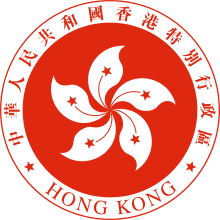Hong Kong–United States relations
 |
|
Hong Kong |
United States |
|---|---|
| Diplomatic Mission | |
| Hong Kong Economic and Trade Office, Washington, D.C. | United States Consulate General, Hong Kong |
Hong Kong–United States relations are bilateral relations between Hong Kong and the United States.
According to the 2012 U.S. Global Leadership Report, 44% of Hong Kong people approve of U.S. leadership, with 38% disapproving and 18% uncertain.[1]
Comparison
| |
| |
|---|---|---|
| Populations | 7,234,800 | 319,435,700 |
| Area | 1,104 km² (426 sq mi) | 9,857,306 km² (3,805,927 sq mi) |
| Population density | 6,544/km² (17,024/sq mi) | 34.2/km² (88.2/sq mi) |
| Capital | - | Washington |
| Largest city | Yau Tsim Mong (Largest district) | New York City |
| Government | Multi-party system | Federal, Presidential, Constitutional Republic |
| Current leader | Chief Executive CY Leung | President Barack Obama |
| Official languages | Chinese, English | No official language at Federal level (English and Spanish are the most commonly spoken languages). Laws are enacted in English and the government operates in English. |
| Main religions | Buddhism 21.3%, Taoism 14.2%, Christianity 11.8% | Christianity 78.5%, Non-Religious 19.8%, Judaism 1.7%, |
| GDP (nominal) | $310.074 billion ($42,437 per capita) | $16.768 Trillion ($53,001 per capita) |
| GDP (PPP) | $412.300 billion ($56,428 per capita) | $16.768 Trillion ($53,001 per capita) |
| Military expenditures | $188.0 billion (Mainland China's) | $664.84 billion (2011)[2][3] |
History
U.S. policy toward Hong Kong, grounded in a determination to promote Hong Kong's prosperity, autonomy, and way of life, is stated in the U.S.-Hong Kong Policy Act of 1992, which stipulated that the U.S. would continue to treat Hong Kong apart from the People's Republic of China even after the 1997 transfer of sovereignty marking the end of British rule. The United States maintains substantial economic and political interests in Hong Kong. The United States supports Hong Kong's autonomy by concluding and implementing bilateral agreements; promoting trade and investment; arranging high-level visits; broadening law enforcement cooperation; bolstering educational, academic, and cultural links; and supporting the large community of U.S. citizens and visitors.
Hong Kong is an active member of the global coalition against terrorism, and has joined the Container Security Initiative and remains an important partner with regard to eliminating funding for terrorist networks and combating money laundering. Hong Kong has passed legislation designed to bring it into compliance with applicable UN anti-terror resolutions and Financial Action Task Force recommendations.
The United States has substantial economic and social ties with Hong Kong. There are some 1,100 U.S. firms, including 881 regional operations (298 regional headquarters and 593 regional offices), and about 54,000 American citizens in Hong Kong. According to U.S. Government statistics, U.S. exports to Hong Kong totaled $17.8 billion in 2006. U.S. direct investment in Hong Kong at the end of 2006 totaled about $38.1 billion, making the United States one of Hong Kong's largest investors, along with China, Japan, and the Netherlands.
The United States and Hong Kong signed a civil aviation agreement in October 2002, which significantly liberalised the aviation market. Hong Kong enjoys a high degree of autonomy as a separate customs territory, with no changes to borders, staffing, or technology export controls since the 1997 handover. Intellectual property rights (IPR) protection has improved substantially in recent years and the introduction of effective new legislation to control illicit production and improved enforcement has now made Hong Kong a regional model for effective IPR protection. The Office of the U.S. Trade Representative and other U.S. agencies now regularly cite Hong Kong as an example for others.
The Hong Kong government maintains Economic and Trade Offices in Washington, D.C., New York City, and San Francisco.
The United States Consulate General Hong Kong is located at 26 Garden Road, Hong Kong. Despite the name, the Consulate General is not subordinate to their country's embassy to the PRC in Beijing. The Consul-General of the United States holds ambassadorial rank, and reports to the Assistant Secretary of State for East Asian Affairs in the US Department of State.[5] By contrast, the US Consuls-General posted to Chengdu, Guangzhou, Shanghai, and Shenyang report to the Deputy Chief of Mission of the US Embassy in Beijing who is directly subordinate to the US ambassador.
Edward Snowden
The Edward Snowden incident in 2013 had been a diplomatic crisis between Hong Kong and United States. On May 20, 2013, Edward Snowden, a former Central Intelligence Agency (CIA) employee, arrived Hong Kong. He leaked classified information from the National Security Agency (NSA) in Hong Kong in early June. Snowden disclosed that "the United States government has committed a tremendous number of crimes against Hong Kong. The PRC as well,"[6] going on to identify Chinese Internet Protocol addresses that the NSA monitored and stating that the NSA collected text-message data for Hong Kong residents.[7] On June 22, U.S. officials revoked his passport.[8] On June 23, Snowden boarded a commercial flight to Moscow.[9][10]
The incidence had proven to be a rare diplomatic conflict between Hong Kong and the United States. The United States has extradition treaties with more than 100 countries, excluding People's Republic of China and Republic of China but including Hong Kong, due to Hong Kong's autonomy in developing relations with foreign nations in a broad range of appropriate fields.[11] Snowden, however, had not been detained by Hong Kong as requested by the United States. Hong Kong authorities said that it was because the United States' extradition request had not fully complied with Hong Kong law,[12][13] and there was no legal basis to prevent Snowden from leaving.[14][15][Notes 1] On June 24, U.S. State Department spokesman Patrick Ventrell said "we're just not buying that this was a technical decision by a Hong Kong immigration official. This was a deliberate choice by the government to release a fugitive despite a valid arrest warrant ... though the Privacy Act prohibits me from talking about Mr. Snowden's passport specifically, I can say that the Hong Kong authorities were well aware of our interest in Mr. Snowden and had plenty of time to prohibit his travel."[18]
See also
- Hong Kong Americans
- Foreign relations of Hong Kong
- Foreign relations of the United States
- United States–Hong Kong Agreement for the Surrender of Fugitive Offenders
Notes
- ↑ Hong Kong's Secretary for Justice Rimsky Yuen argued that government officials did not issue a provisional arrest warrant for Snowden due to "discrepancies and missing information" in the paperwork sent by U.S. authorities. Yuen explained that Snowden's full name was inconsistent, and his U.S. passport number was also missing.[16] Hong Kong also wanted more details of the charges and evidence against Snowden to make sure it was not a political case. Secretary for Justice Rimsky Yuen said he spoke to U.S. Attorney General Eric Holder by phone to reinforce the request for details "absolutely necessary" for detention of Snowden. Yuen said "As the US government had failed to provide the information by the time Snowden left Hong Kong, it was impossible for the Department of Justice to apply to a court for a temporary warrant of arrest. In fact, even at this time, the US government has still not provided the details we asked for."[17]
References
- ↑ U.S. Global Leadership Project Report - 2012 Gallup
- ↑ Updated Summary Tables, Budget of the United States Government Fiscal Year 2010 (Table S.12) Archived July 25, 2010, at the Wayback Machine.
- ↑ "Department of Defense" (PDF). Retrieved February 26, 2014.
- ↑ Declared Turtle Trade From the United States: Destinations (data for 2002-2005)
- ↑ Christopher J. Marut Appointed as Director of the Taipei Office of the American Institute in Taiwan, American Institute in Taiwan, May 8, 2012
- ↑ Lana Lam (June 12, 2014) Edward Snowden in Hong Kong South China Morning Post
- ↑ Eli Lake (June 25, 2013) Greenwald: Snowden's Files Are Out There if 'Anything Happens' to Him The Daily Beast
- ↑ US revokes NSA leaker Edward Snowden's passport, as he reportedly seeks asylum in Ecuador Fox News Channel June 23, 2013
- ↑ Shane, Scott (June 23, 2013). "Offering Snowden Aid, WikiLeaks Gets Back in the Game". The New York Times. Retrieved April 11, 2015.
- ↑ Makinen, Julie (June 23, 2013). "Snowden leaves Hong Kong; final destination unclear". Los Angeles Times.
- ↑ "9-15.100 International Extradition and Related Matters: Definition and General Principles". United States Attorneys' Manual. U.S. Department of Justice. Retrieved 11 June 2013.
- ↑ Perlez, Jane; Bradsher, Keith (June 24, 2013). "China Said to Have Made Call to Let Leaker Depart". The New York Times. p. A9 (US edition).
- ↑ "HKSAR Government issues statement on Edward Snowden" (Press release). Hong Kong Government. June 23, 2013.
- ↑ "Snowden left HK lawfully: CE". Hong Kong Information Services Department. June 24, 2013.
- ↑ "No delay in Snowden case: SJ". Hong Kong Information Services Department. June 25, 2013.
- ↑ "Hong Kong did not assist Snowden's departure". Global Post. Agence France-Presse. June 25, 2013.
Yuen also said there were discrepancies and missing information in documents used to identify Snowden. 'On the diplomatic documents, James was used as the middle name, on the record upon entering the border, Joseph was used as the middle name, on the American court documents sent to us by the American Justice department, it only said Edward J Snowden,' he said. Hong Kong authorities also noticed that documents produced by the U.S. did not show Snowden's American passport number.
- ↑ Luk, Eddie (June 26, 2013). "Justice chief spells it out". The Standard. Hong Kong.
- ↑ Daily Press Briefing United States Department of State June 24, 2013
-
 This article incorporates public domain material from the United States Department of State website http://www.state.gov/r/pa/ei/bgn/index.htm (Background Notes).
This article incorporates public domain material from the United States Department of State website http://www.state.gov/r/pa/ei/bgn/index.htm (Background Notes).


.svg.png)